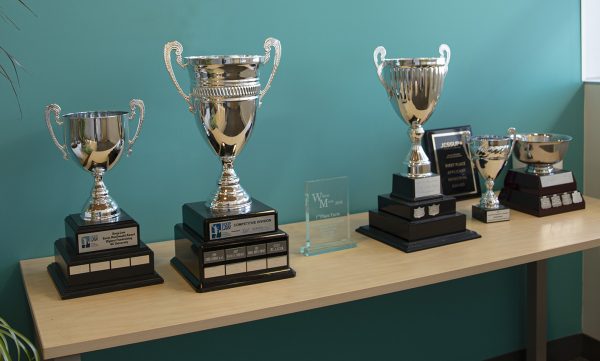Law students from across Canada are gathering at Thompson Rivers University (TRU) to compete in one of the country’s top Indigenous law events — a first for the Kamloops university.
On Friday, March 8, and Saturday, March 9, the 2024 Kawaskimhon National Aboriginal Moot brings together experts in Indigenous law, and students and coaches from 20 law schools across the country.
This outstanding event coincides with the 10th anniversary of TRU Law’s first graduating class.
“The event allows students, coaches and guests to experience the traditional territory of the Tk̓emlúps te Secwépemc and visit the amazing TRU campus,” says Murray Sholty, a teaching professor in the Faculty of Law and the Bob Gaglardi School of Business and Economics.
“To be a part of this event as a former TRU Law student, now a moot coach and newly appointed tenure-track assistant teaching professor, and an organizer of this year’s event, is truly an honour.”

Will TRU Law add hardware from this year’s Kawashimhon National Aboriginal Moot to its collection?
Local issue with personal ties
Students will delve deeply into relevant matters happening within the local Secwépemc Nation, he adds.
This year’s moot problem focuses on the Trans Mountain Corporation’s planned pipeline deviation on the Stk’emlúpsemc te Secwépemc Nation lands near Pípsell, a cultural heritage site south of Kamloops (also known as Jacko Lake). The Stk’emlúpsemc te Secwépemc Nation originally consisted of eight tribes, of which two remain: Tk’emlups and Skeetchestn.
It’s a local issue with personal ties— especially for this year’s TRU Law moot coaches.
Chrystie Stewart is from Tk’emlúps te Secwépemc. She is also a TRU Law alum, lawyer at Stewart & Springford LLP and guest speaker at the event. Sholty’s roots are with Hagwilget Village and he was raised in Fort Fraser; both communities have connections to issues surrounding natural resource projects including the Coastal GasLink, forestry and mining.
Accepting the call to action
Stewart and Sholty balanced their team guidance duties with successful lobbying to bring this year’s Kawaskimhon Moot to Kamloops.
“Dean Daleen Millard immediately recognized that this event was in alignment with TRU Law’s Indigenous initiatives and did not hesitate to green light going after the event being held here,” says Sholty.
The event ties into the TRU Faculty of Law welcoming the findings of the Truth and Reconciliation Commission and accepting the Call to Action #28, he says.
“Call to Action #28 called upon law schools across Canada to require all law students to take a course in Aboriginal people and the law including the history and legacy of residential schools in Canada, the United Nations Declaration on the Rights of Indigenous Peoples, Treaties and Aboriginal rights, Indigenous law and Aboriginal-Crown relations,” he says.
“The event also puts TRU Law’s Indigenous courses and content into action at the national level.”
Experience beyond classroom
Sholty knows firsthand what students gain from participating in a national moot because he was part of TRU Law’s first graduating class and attended the 2013 moot as part of his program experience.
“The event is important for students,” he says. “They develop research and writing skills along with table negotiation skills. They examine issues that include real-life projects that directly impact local people and the area. Thus, replicating what they will be doing once they are done law school and practicing law.
“Students also learn how to remain impartial when approaching controversial issues and get the opportunity to establish lifelong networks with other students from across Canada who have a passion for this area of law.”
The TRU team consists of third year law students Abigail Falk, Anisha Grewal, Eric Rogers, Henry Wearmouth and Shannon Tan and coaches Stewart and Sholty.
Special guests at the moot include:
- Chief Justice Leonard S. Marchand, chief justice of British Columbia
- Judge Linda Thomas, Provincial Court of British Columbia
- Judge Raymond Phillips, Provincial Court of British Columbia
- Dean Daleen Millard, Faculty of Law — Thompson Rivers University
- Kory Wilson, chair — BC First Nations Justice Council
- Amanda Carling, CEO — BC First Nations Justice Council
- Chrystie Stewart, lawyer — Stewart & Springford LLP
- Charlotte Rose, lawyer — Qwelmínte Secwépemc Office
Moot sponsors include:
- Olthuis Kleer Townshend LLP
- BC First Nations Justice Council
- Stewart & Springford LLP
- First Peoples Law LLP
- Ratcliff LLP
- CN
- Clio Legal Software
- Miller Titerle + Company
- Forward Law LLP
- Woodward and Company LLP
- Michael Reed Law Corporation
- RJ Toor RE/MAX Real Estate
- Terra Timber

